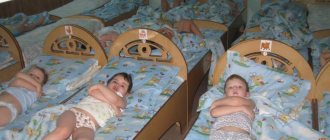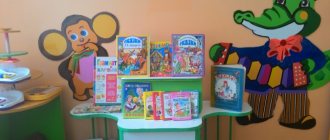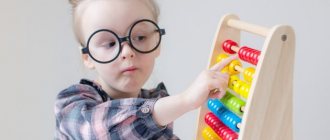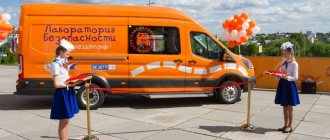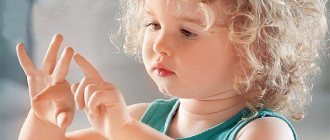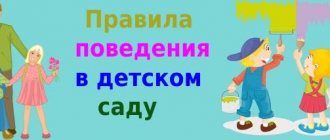Holding a wake-up call depending on the time of year and month
Wake up involves waking up children to calm melodious music, after which the kids must perform several physical exercises right in bed. Depending on what time of year it is outside, the melody can be different: quiet and classic if it is raining or snowing in winter, catchy and cheerful if the weather is sunny and warm outside.
The process of waking up children
Children should wake up and turn in different directions to the beat of the music, stroke their legs, spread their arms, clench and unclench their hands, and bend their knees. Everything is done strictly one by one, after which all children must stand on the massage carpet and perform several breathing exercises.
Gymnastics after waking up helps the child concentrate on subsequent lessons, strengthens children's physical health and improves their mood. It is for these reasons that the teacher should work with his pupils regularly, alternating games among themselves so that the children do not get tired of them.
Basic types of invigorating gymnastics and rules of conduct
Today, experts have invented many methods of invigorating gymnastics to awaken children. Among all this diversity, there are several that are most frequently used and effective. We are talking about verbal, visual, playful and practical exercises. Verbal awakening gymnastics consists of elements of logorhythmics, which are combined into one system of physical exercises to correct the child’s speech.
All movements must be accompanied by verses or phrases for the development of speech-motor and auditory analyzers. Also, during verbal gymnastics, breathing is regulated, motor skills are consolidated and the correct pronunciation of sounds is normalized. The first part of this exercise includes running and walking, and the second part includes movements that are accompanied by playful self-massages and poetry.
Physical education of a young child
Note! As for visual gymnastics, it contains elements of corrective exercises. This type of exercise is designed to prevent the development of flat feet and eliminate postural disorders.
The main components are:
- exercises that form and strengthen the skills of correct posture;
- activities that form a stereotype and correct breathing.
The relative position of body parts is improved due to the respiratory muscles, so visual exercises are especially important.
Game gymnastics
A playful form of exercise helps children concentrate on performing exercises such as climbing over obstacles, running, jumping or catching a ball. The game is an indispensable tool that helps improve movement, coordination, speed, strength and endurance. During the game, memory, imagination and thinking are activated.
Important! Playful invigorating gymnastics should be accompanied by music, poetry or counting rhymes. Thus, children not only strengthen their physical fitness, but also expand their vocabulary.
Game exercises
Game exercises consist of introductory, main and final parts. The introductory part consists of easy running or various types of walking, as well as a game for concentration and exercises for the respiratory system. The main part includes a high level of mobility game, and the final part is designed to provide children with recreational activities and walking with breathing exercises.
Practical invigorating gymnastics
The practical form of training with children in most cases is represented by running, which is designed to regulate the load, strengthen the respiratory and cardiovascular systems, as well as coordinate the work of joints, muscles and ligaments.
Note! Running should be slow or moderate, during which the teacher needs to closely monitor each child so that he does not overdo the load, does not injure himself and rests in a timely manner.
The load must be increased gradually, taking into account the individual characteristics of each student and his physical fitness. For kids who have just entered kindergarten or have not attended classes for a long time, more than 50% load while running is contraindicated.
Invigorating gymnastics after sleep in the middle group: a file cabinet according to the Federal State Educational Standard
In the card index of exercises for invigorating exercises, a couple of the most popular ones are highlighted. These are “Clapperboard” and “Drawing with Legs”. When performing the first exercise, children should kneel and place their hands on their waists. As you inhale, you should spread your arms to the sides, and as you exhale, lower them down, clap your hands and say: “Clap!”
Note! The exercise must be repeated at least 7-8 times.
During the “Drawing with Legs” exercise, the child must draw geometric shapes (rhombus, square or triangle) in the air with his feet. Next, place the legs so that the entire foot touches the floor, and then rise on the toes, lifting the heels off the floor as much as possible. While in the starting position, raise your fingers up, without lifting your feet off the floor even a millimeter.
Complex of morning exercises for the middle group
Awakening gymnastics for the middle group of preschool educational institutions
The key goal of physical exercise after nap time in kindergarten is to improve the muscle tone and mood of children. You should not limit yourself to exercise alone, because contrasting air baths are also effective in strengthening and maintaining the health of pupils.
Awakening gymnastics in kindergarten
Note! Exercise helps your child ensure a smooth transition from sleep to wakefulness so that he can engage in active activities.
It is advisable that smooth, quiet music be played in the room during the exercises. There is no need to wait until the whole group wakes up, since children can join everyone as they wake up.
Goals and meaning for children 4-5 years old
This or that method of physical or intellectual education pursues certain goals and objectives. As for awakening gymnastics, it is intended to solve the following problems:
- eliminating the consequences of sleep: drowsiness, lethargy, etc.;
- increasing the tone of the children's nervous system;
- strengthening the functioning of the respiratory and cardiovascular systems, as well as the system of endocrine glands.
Solving such problems helps to increase the physical and mental performance of the child’s body, and after awakening gymnastics, he will be ready for mental and physical stress.
As for the main stages that make up the complex of health exercises, they are represented by warm-up exercises in bed immediately after waking up, simple self-massage, walking along the “health path” and outdoor games in a room where the air temperature is contrasting.
Note! It is advisable to finish the exercise by wiping with cold water or dousing your hands and feet with a contrasting douse.
The duration of health-improving exercises should be at least 15-20 minutes, and if gymnastics is performed in bed, then no more than 5 minutes. At the same time, it is strictly forbidden for children to make sudden movements, as this can lead to a drop in blood pressure, stretching of muscle tissue and dizziness.
An example of health activities with children
Methodology for conducting invigorating gymnastics: time plan and example notes
To maintain interest and maintain the child’s emotional state, you need to follow a clear time frame throughout the exercise. Exercises in bed immediately after waking up should last at least 2.5-3 minutes, the active block - 3-4 minutes, and breathing exercises - 2-3 minutes.
Active exercise in the garden
Note! Children should walk on massage mats for 1 minute. Tasks should be combined in such a way that the entire lesson lasts no more than 10 minutes.
The teacher's standard summary must indicate the educational area, location, explanatory note and objectives of the lesson. In the line “educational area” you need to enter physical development, in the “venue” - a playroom or bedroom of a kindergarten group. As for the main goals, the following are suitable:
- developing motivation to maintain and strengthen one’s health;
- eliminating drowsiness and lethargy in children through physical activity;
- formation of correct posture and prevention of the development of flat feet.
Also in the summary it is worth mentioning social-communicative, cognitive, speech and artistic-aesthetic development. Social-communicative involves nurturing friendly relationships between all students in the group, so that they learn to be mutually polite and make concessions. In the process of cognitive development, children consolidate their existing knowledge about the world around them and its components.
As for speech development, with its help the articulatory apparatus is prepared to pronounce sounds correctly, and the child’s vocabulary is also enriched.
Note! In the process of artistic and aesthetic development, the baby develops an interest in art, music and a sense of rhythm.
Also in the notes you need to write down the type of activity (game, communicative, motor or cognitive) and equipment that may be needed during the gymnastics class. You can use ribbed tracks, colored sheets, gymnastic hoops or massage balls.

